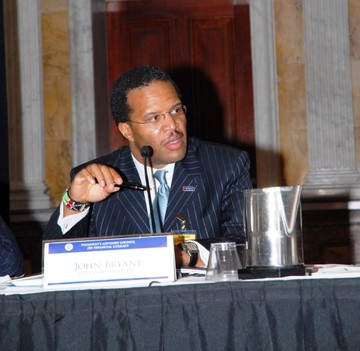John Hope Bryant has dedicated his life to promoting financial literacy and ending poverty. As founder of the nonprofit Operation Hope, he works on bringing minority and poor communities into the financial mainstream by promoting private-sector investment in inner cities as well as education for individuals. He was recently appointed vice chairman of the President’s Advisory Council on Financial Literacy. U.S. News spoke with Bryant about why financial literacy matters and what can be done to promote it. Excerpts:
Why is financial literacy important?
The big-picture answer is this subprime mortgage crisis. People got payment shock. I’m not talking about poor people…. We’re talking about people who make six-figure incomes who asked the wrong questions. They asked, "What was the payment?" not "What was the interest rate?"
This crisis that we’re dealing with—yes, there’s fraud; yes, there’s greed; yes, there’s misrepresentation and investor speculation. But at the heart of this, people were victimized far easier because they allowed themselves to be victims. Because they were financially illiterate. Because they could not defend themselves and their families from financial predators.
There’s nothing wrong with subprime lending. It lifts poor people out of poverty. The problem is irresponsible subprime lending fed by massive levels of financial illiteracy.
So you think financial literacy plays a big role in the choices people make.
The dropout rate in high schools across the country is about 30 percent for all students, but among inner-city kids, it’s 50 to 70 percent. That is an economic death sentence. It’s also a financial handicap for American competitiveness.
I believe one reason they’re dropping out of school is they don’t believe education is relevant to their future. One of easiest ways to make it relevant is to show kids how to get rich legally. That’s financial literacy. It’s a literacy issue…. We’re the largest economy in the world, but no one is teaching our children about checking or savings accounts or budgeting. It’s a sin. We live in a democracy rooted in capitalism, yet we’re not teaching our children the language of money. We’ve got to make smart sexy again.
How can that be done?
The president, in signing this executive order, is making financial literacy a policy of the federal government. That’s the first major step. Then, we’ve got to work to integrate financial literacy in schools at the earliest age possible and into the workplace.
The No. 1 cause for black and brown people jumping out of college is money. The No. 1 reason adults divorce is money. What people get into arguments about is primarily money based. What depresses and discourages and demoralizes people and lowers productivity is them worrying about money. Money is the one thing that everyone obsesses over and nobody understands. It’s the last taboo. When was the last time you talked to a girlfriend and said, "Girl, my credit score is 500." They’re ashamed to admit they don’t understand. So for kids, we’ve got to make smart sexy again, and for adults we’ve got to remove the shame from talking about money.
Do you think financial problems are caused more by a lack of financial education or just the fact that people have no other choice because they’re struggling to pay for necessities?
They are one and the same. Education is the ultimate poverty eradication tool. When you know better, you do better. If you don’t have education or knowledge, you have limited choices. But a rubber band expanded never returns to its original size. If you don’t have a lot of education or literacy, you don’t have a lot of sense of what your choices are, and you feel trapped by limitations of income and you’re easier to be preyed upon.
Some research suggests financial education doesn’t have much impact on people’s behavior.
You’ve got to get them at the very earliest age possible. If someone is 45 and has been making bad choices for almost 30 years, their house is in foreclosure, and they have debt up to their eyeballs, then that person is going to be very hard to talk to about saving $100 a month. That person is like, "The house is burning. I just need some water to put it out."
But let me tell you about one young 12-year-old, Hispanic, dual-language-speaking child, whose parents speak only Spanish. She goes through our program. We find out she is the head of household. So she would leave school and go to a check casher. She thought Bank of America was the bank of America. She thought check cashers were a mainstream financial services provider. Only after our program, she understood her parents’ experience was not the totality of the American experience…. Her family got banked, because she got knowledge.
Education is not a panacea; it can’t change everything by itself. Role models [are a big part of it]. We got the president’s council to create a financial literacy corps at volunteer.gov. You can volunteer in any ZIP code in America. We are trying to recruit 25,000 volunteers around this country. It’s essentially a Peace Corps for financial literacy.
What are the council’s other goals?
We will be introducing a money math curriculum, which is Treasury Department approved, for every middle school child. We want it to be in every middle school in the country, ingrained in the curriculum. We will be reaching out to all superintendents. It’s free. They can download it from the Treasury Department’s website. Second, [council chairman] Chuck Schwab will lead the effort to get financial literacy embedded into the workplace. Third, I’ll be leading the effort to encourage institutions to bank the unbanked.
We’ll have an honor roll program for employers, so an employer can qualify to be listed on the Treasury Department’s website, and we’ll be doing a similar program for high school students, a rewards program for outstanding financial literacy. It includes scholarships and acknowledgment by the president of the United States for their exemplary efforts.
What would you like to be the state of financial literacy in a decade?
I would like to ensure that this conversation doesn’t happen. That it’s so commonplace that there’s no necessity to have an interview on why there’s a necessity to have financial literacy. It should become as commonplace as driving. Right now, people say "reading, writing, and ‘rithmetic." Well, I believe in "reading, writing, ‘rithme
tic, and financial literacy." It should be a common core building block for our culture.


